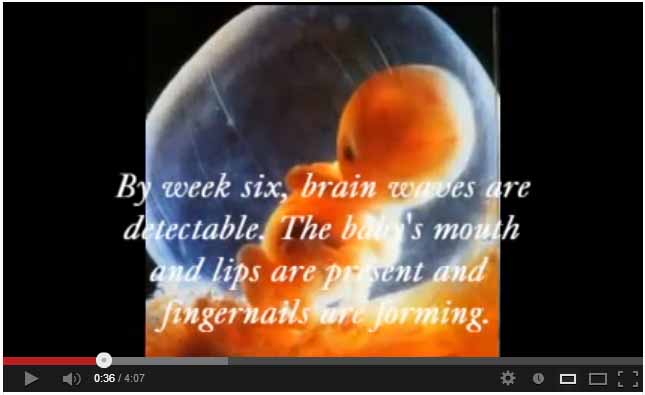Defending the Unborn
"To be, or not to be?"
or
"Where do you draw the line?"
This latter question recently faced college students
strolling through campus during the first week of spring semester,
thanks to
Justice for All, a pro-life organization that trains thousands to
make abortion unthinkable for millions, one person at a time. The
purpose of the question: stimulate discussion on human rights and
abortion.
Many Americans are in favor of pro-choice legislation,
especially from the compassionate perspective of averting one of the
potential injustices of rape –a woman being required to give birth to a
child that she did not willingly consent to conceive. Up until 2011, I
was also.
I've never favored abortion, hardly anyone does. Most
people agree it’s a difficult and unpleasant choice. Nonetheless, I
couldn't see myself as someone wholly pro-life. My main hang-up was the
thought of forcing a daughter who had been raped to go through a
pregnancy. What I failed to think about was the life of the child. What
about his or her life? Do they have a right to choose?
Although evil can never become good, good can come from
evil. A child coming into the world, a child that is in no way at fault
for the wrongful act of his or her biological father, is an example.
"You saw me before I was born." Psalm 139:16 (NLT)
Thankfully, a
Master in Theology and Philosophy explained his position as someone
pro-life. Our discussions shed light on the importance of defending the
unborn. I also had the opportunity to attend a training session hosted
by Justice for All. Through this session, I became aware that only two
percent of abortions are the result of rape. What about the other 98%?
Rape is a terrible occurrence. Those who commit this
crime should rightfully be punished. Those who have been through such an
experience should receive our consideration, love and support.
For the purposes of discussion, let's suppose a woman
who has been raped, conceives, and decides to keep the child. The child
grows to the age of two but then mom decides she doesn’t want the child
anymore due to financial strain and unaccepting parents. She decides to
end the child’s life. Would this be acceptable? Of course not, it would
be considered murder and she would likely go to jail.
If it is not okay in the above example, how long after
a child is conceived, but still in his or her mother's womb, should it
be legal, if at all?
"Where do you draw the line?"
Perhaps a person
would propose that the time when an abortion is acceptable should be
based on degree of development. A child that is five years old and can
play a game of baseball is certainly more developed than a five-month
old baby still in his or her mother's womb. But is not a fifty-year old
adult more developed than a five-year old child? Of course, yet both
have the same right to life. That same five-year old most likely
possesses within their body the capacity for reproduction, but that part
is not yet fully developed –a child, from the moment of conception, has
all the DNA necessary to become an adult.
Perhaps a person would say that the time when an
abortion is acceptable should be based on size, for example before three
weeks of development, or three months. Does this mean that a person who
is taller or larger should have more rights? Does this mean that a
three-week old baby, who would just begin to have a beating heart,
should have fewer rights than a three-month old baby?
Perhaps a person would state that the time when an abortion
is acceptable should be based on degree of dependency: since the child
is still connected to his or her mother’s body, and could not live
without her, he or she does not have a separate life, and therefore,
separate rights. Essentially, the child is dependent on mom and since
her body belongs to her, she should be able to choose when an abortion
is acceptable.
Let’s suppose you work as a lifeguard. You’re closing
for the day when you suddenly hear a splash. You look over your shoulder
and see a three-year-old has fallen into the pool. You’re the only one
present; the child is dependent on you or they will drown. Is it okay to
walk away? Of course not, it would be a crime, and in some
jurisdictions, even if you weren't a lifeguard. If we care about others
as we care about ourselves, especially those at the earliest or final
stages of human life, we can acknowledge that degree of dependency
doesn’t nullify a right to life.
I’m glad that in America women have nearly the same privileges and
opportunities as men. These equalities have been achieved over many
years of entrenched inequalities.
Notwithstanding
misfortune, women in America can pursue any future that fulfills their
hopes and dreams. But what about the woman still in her mother’s womb? A
person’s gender can be determined from their DNA from the moment of
conception. What about her privileges and opportunities? What about the
hopes and dreams she’ll have?
If a woman and her unborn child are murdered, the
person who committed the crime would likely be charged with two counts
of murder, one for the woman and one for the child. Is it reasonable for
our society to treat a man or woman at their earliest stages of
development as though they don’t have rights because they are unwanted?
There are around 3,700 abortions in America every day,
3,700 Americans who were denied their God given right to life, liberty
and the pursuit of happiness.
"In the words attributed to Mother Teresa,
"If abortion isn't wrong, what is?"
For the relativist who carries his or her
philosophy to its logical conclusion, the answer would be "nothing is
'wrong.'"
Absolute Relativism: The New Dictatorship
and What To Do About It


